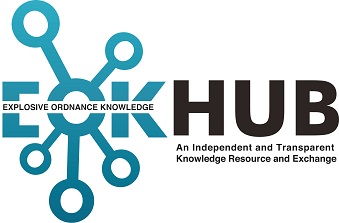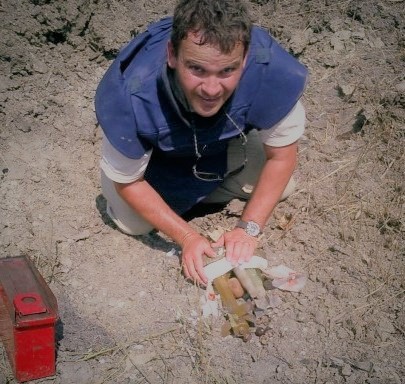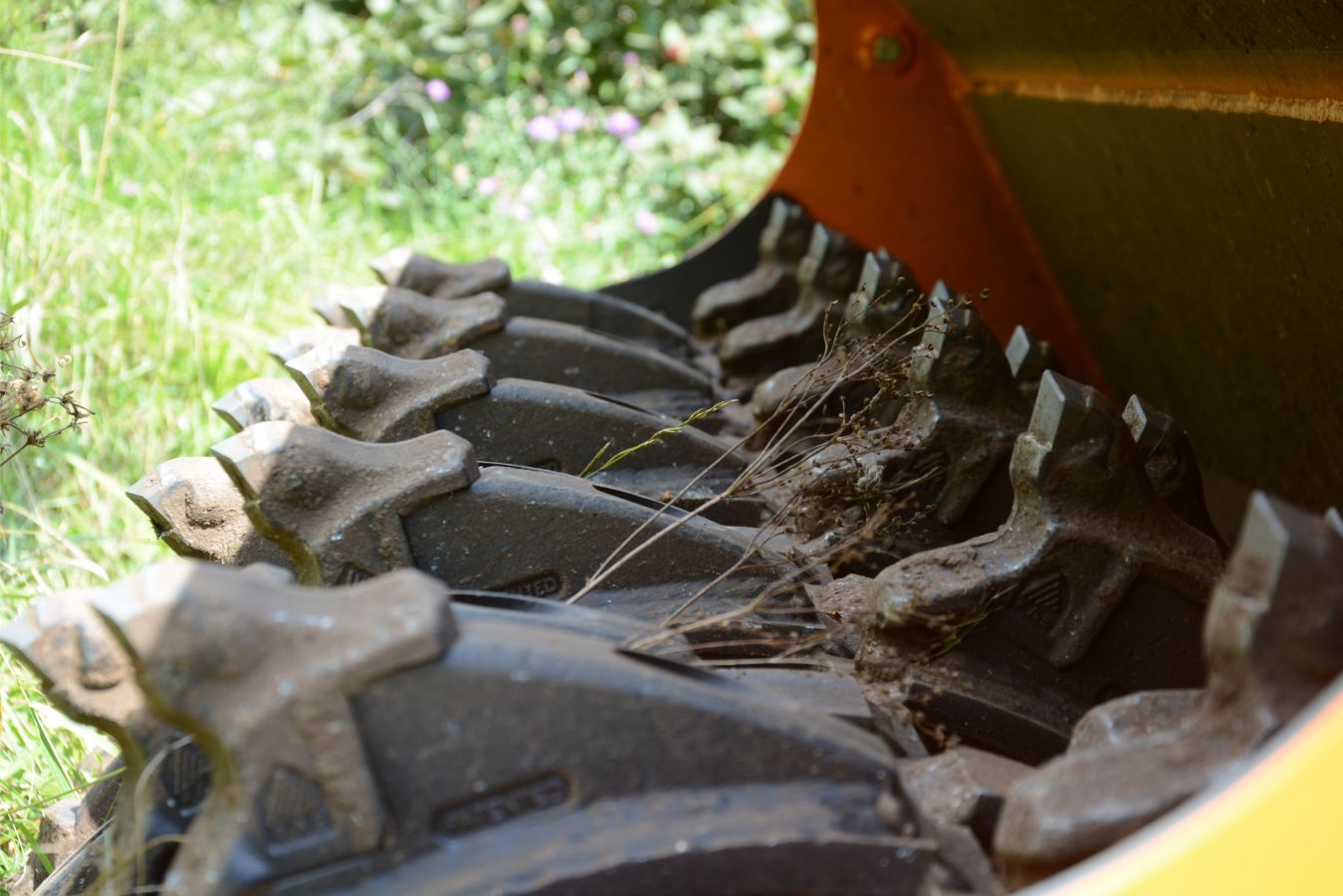EOKHUB interview
Ben Remfrey MBE MI Exp. E, Managing Director at Praedium Consulting Malta Ltd and MAT Kosovo (MK) LLCMr. Remfrey, many of our associates in EOKHUB finished your training either in Kosovo or in Kenya. Because of that you are a primary choice for our Faces of Mine Action on our web page. You have been in the explosive ordinance sector almost your entire life, starting at the age of 16 when you joined the British army.
Q1: Where were you born. Were you a fairly good child, or you were you more prone to get into trouble?
AQ1: I was born in Cyprus in the early 1960’s, I think like many who take the time to read this interview, I was a normal boy growing up except I had the real benefit of being in a different culture and climate (definitely warmer). My Father was a serving soldier, so I had a grass roots upbringing and travelled extensively as the British Army still had many overseas roles 50+ years ago. As for being a good child, probably not the case all the time, while some of the time I was of course well behaved. I had my moments. Regularly went AWOL as a child looking for one (mis)adventure or another. Played lots of sport and I was probably what you would call one of life’s ‘late developers’!
Photo 1: Ben Remfrey stands second from the left
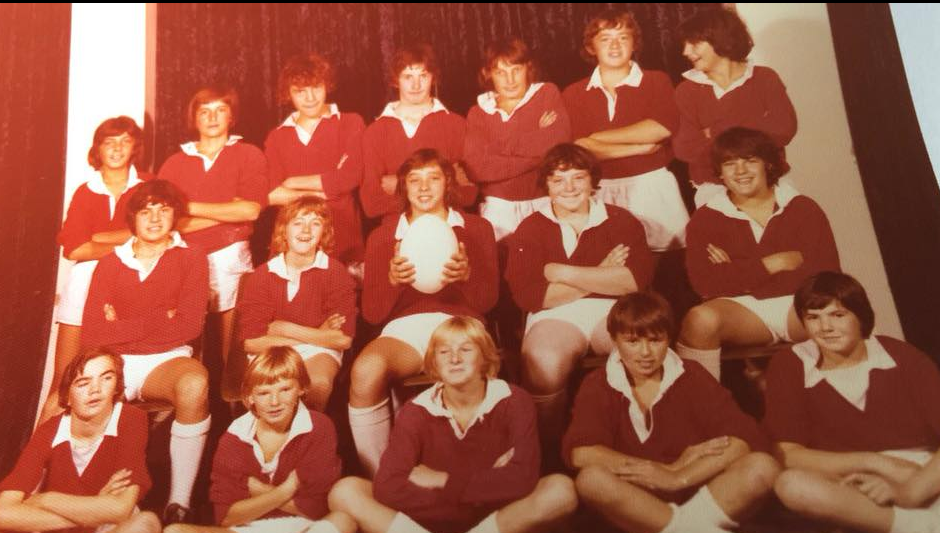
Q2: Why did you join the British Army, and how did you come to choose Royal Engineering and bomb disposal?
AQ2: I wanted to join the Army from dot, so as soon as I could I was fortunate enough to be accepted into the Junior Leaders Regiment, Royal Engineers as soon as I turned 16. The Royal Engineers was and still is the very best corps in the British Army. I had a great time and have many friends from that first day in 1979. I loved sports and the Army embraces that, so I was fortunate to keep fit and when the time was right, I joined a Commando unit – best decision I ever made.
Photo 2: Army days
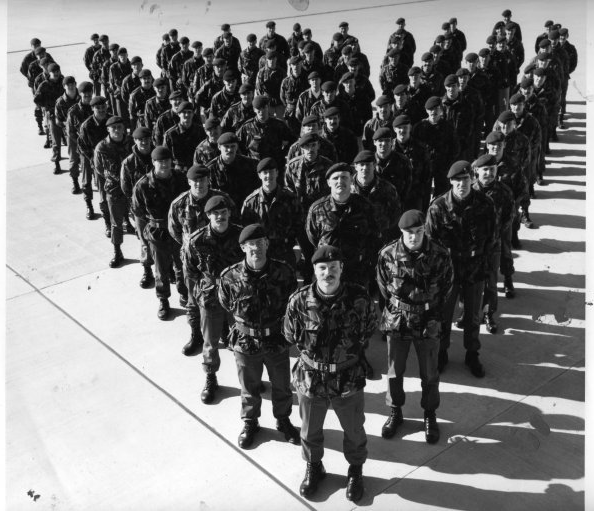
Q3: You jumped into the explosive ordnance commercial/NGO sector in 1991, in one of the first global mine clearance projects. Can you tell us more about that project and what you learn there?
AQ3: In 1990 I was working as an inspection diver in the O&G industry in the Arabian Gulf. When Iraq invaded Kuwait and of course the first Gulf War began, I became involved in the offshore side initially and then made what could only be described as a ‘bold decision’ to enrol with Royal Ordnance (British Aerospace) and be selected to be part of the team involved in Kuwait’s post war clean up. Our task was vast, clearing large areas of the O&G infrastructure of massive amounts of ERW, our group was initially quite small and the broad nature of what we were tasked to do was, when I look back, mind boggling in terms of the level of contamination from confrontation areas to stockpiles of ammunition which had been abandoned. What is interesting to recall is the utter lack of International Standards back in those days, what we did and how we achieved it, still sends shivers down my spine even today, but it was a task that needed to be done and we did it! Today, the Kuwait project in 91/92 is widely viewed as a seminal moment in our industry, a time before formal SOP’s even let alone rigerous standards, where tasks were met and performed in the moment and not with any great amount of prior planning and preparation – this mainly due to the sheer volume of ordnance in Kuwait and Kuwait’s haste in wanting its O&G back online. In terms of what I am fortunate enough to do today – standards led training – it was certainly the foundation for me, I learnt a great deal.
Photo 3: Kuwait time
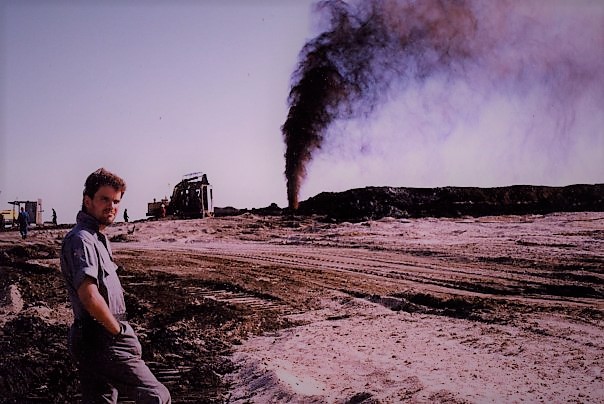
Q4: After Kuwait, one of your next jobs was assessing and developing a counter landmine and UXO strategy for Bosnia and Herzegovina and Croatia. You worked in a totally different environment there. What were some of your impressions, challenges, unique aspects? From this position what is your professional opinion about standard of mine clearances in Croatia and Bosnia and Herzegovina?
AQ4: The situation in the Former Yugoslavia was very different to Kuwait for example, mainly due to habitation in the areas of confrontation, displaced people and the number of protagonists involved in BiH/ Croatia. My role began with gathering information and delivering briefings to NATO and United Nations Peace Keeping personnel and later gathering information on areas suspected of being mined. Meeting the former waring factions and winning their trust, so that they would where possible give detailed information which would enable future clearance operations to happen. IMSMA while in its infancy played and important part then, as it does now, and the IMSMA team at the UNMAC in Sarajevo worked tirelessly trying to collate massive amounts of information into a relatively immature system, I have the utmost admiration for their hard work. I was a part of a growing team though, small cog in a wheel that many who were in Kuwait transitioned through. Some of the names still out there and involved in HMA globally were involved in the Former Yugoslavia as well as Kuwait – we are getting fewer and what amazes me is the guys who are still ‘operators’ out there 30 years on, continuing to ‘do what they do’ and mentoring others, and above all the current national staff in each country programme, these are the real heroes of our industry.
Q5: With MAT you founded training centre in 2007 and have set the standard for training very high. Tell us more about the early beginning.
AQ5: In 2007/8 I was fortunate to become involved with the International Mine Action Training Centre (IMATC) in Embakasi, Kenya. Initially we were involved with the K9 MDD side of the IMATC running a kennels and supporting the IMATC team with integrated assets. This soon broadened to MAT then running IMAS compliant EOD courses, mainly for those working in Africa, but due to the need this soon attracted students from across the globe. Again I was fortunate to work with likeminded people who all had the same objective, that of providing the type of training people needed to then deploy back to their country’s and continue the work they were doing prior to attending the courses, but I like to think in a safer and more standards led way. As well as civilian and UN personnel we were able to be involved with capacity development of country’s militaries, such as for example ‘Rwanda’ and ‘Uganda’, each programme was quite different in terms of the perspective of the country’s Government and Military and the role the soldiers would play once trained, equipped and returned to their countries. We played an important mentoring and monitoring role thereafter with both example projects, each had different outcomes and Rwanda still stands out as one of the finest projects I have ever been involved with, where Rwanda met its Ottawa Article 5 obligations of reaching mine free status by Dec 2010.
Q6: The training centre had different phases in development, did you ever want to give up and go back to the field in some moment?
AQ6: The short answer is I was still involved in operational projects but not as an operator, more of a director and MAT was still doing clearance in other regions at this time, so while we were involved in training – as many agencies do and still do – we were also focused on IMAS compliant training with medium term goals in terms of meeting deadlines and achieving the aims of specific projects. Progression of thought, intent and reasonable expectation is an important factor in anything you do, so is endeavour and commitment of all stakeholders, unless you have all on the same trajectory then you have problems!
Q7: Currently we see that the explosive ordnance threat is undergoing a major change. What kind of courses does the training centre provide and how do you react when new threats appear in the theatre?
AQ7: Our Training Establishment, first and foremost, endeavours to provide what clients need opposed to what they don’t need, all the while ensuring training meets and exceeds IMAS. This has always been my ‘raison d'être’ and approach to training at all levels. Clearly, we deliver IMAS EOD L1 through to L3+ (basic, intermediate & advanced) with the growing speciality areas such as PSSM/ Ammunition Management, HIEDC, Team Medics and evolving IEDD & Search courses. Again, this is driven by the ‘need’ in the industry opposed to anything else. There is no ‘Zero-to-hero’ approach here either and this should be understood. Progressive training in levels and in the time available is the right approach in my mind. Pre-requisites to attend each level remain having the prior level in terms of certification or in many cases experience in HMA. We developed the IMAS Conversion Course for those leaving the military for example, as there is a ‘need’ as those with prior EOD certification do not need to learn EOD as they are competent in EOD, while IMAS and HMA is unfamiliar to them, so we concentrate the IMAS CC to teach HMA principles and IMAS standards. Another area we are developing training to now is the ‘Maritime’ industry and ‘Search’, courses which start in Q4 2019 and Q1 2020.
Photo 4: IEDD training
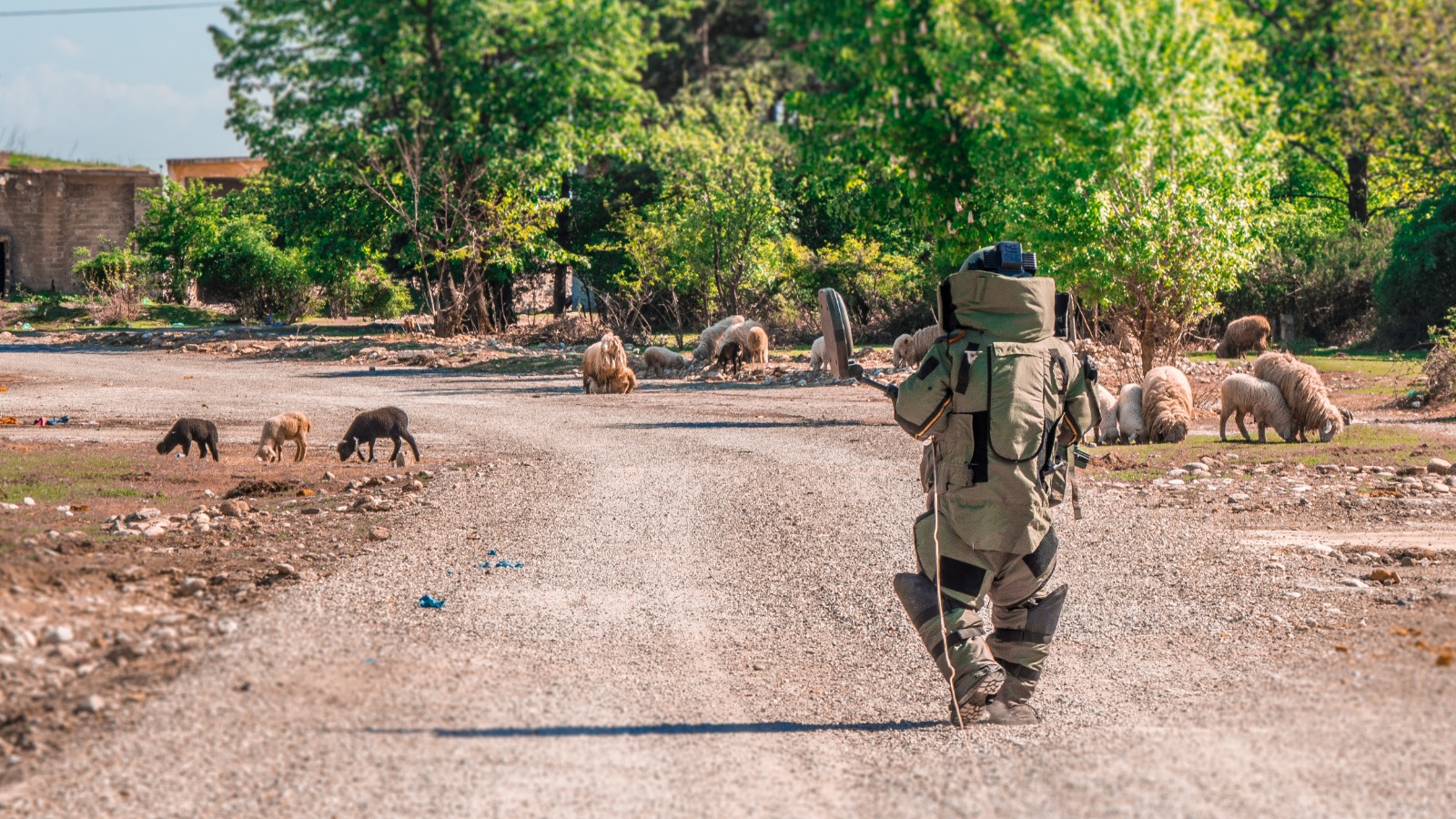
Q8: Students graduating from your course find that the certificate is recognized worldwide without any hesitation. How did you succeed in that?
AQ8: This is purely down to reputation which is built on capability, accessibility and trust. Clearly, we have standards which those in the industry trust to be at the level required. It’s important to note though that many of our agency clients could deliver the training themselves but find its cost effective and easier to use our training services. Our capability can deliver these training services in a benign environment which has everything at hand for training of the highest standard. We have exclusive access to range facilities with a myriad of live targets, so all students ‘qualify’ on live demolitions for example. Our Establishment is accessible to all - as long as we have time to arrange the visas, which we do as part of our service. Prior planning and preparation is always key to ensure we have the facility available for clients. We can also run courses side by side such is the infrastructure we have in place, which we improve continually to ensure training can be delivered to the best of our ability. We are most fortunate that many commercial agencies, NMAA’s and NGO’s trust us to partner with them for training their national and expatriate staff. This is testament to the hard work of our team in ensuring we can deliver what is required and do so in a cost-effective way and in the time available, that’s what it all boils down to. Yes, our certification is recognised globally and to maintain this we strive to ensure we improve our services continually. Its worth noting that we have minimum standards that have to be met and if these are not met then we cannot certify individuals, we have an obligation to the industry and this is critical.
Photo 5: EOD L3 Training
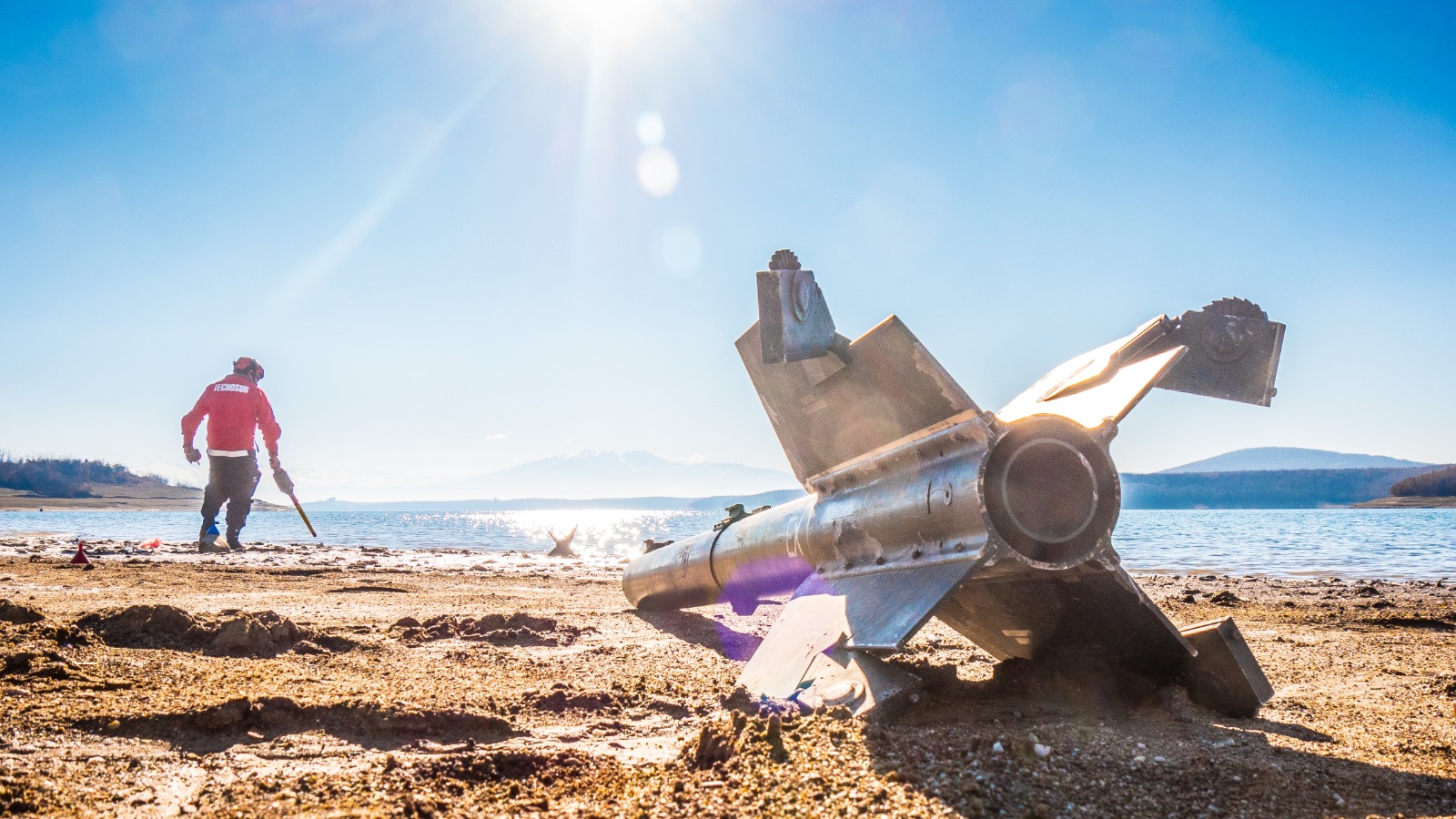
Q9: Do you have some future plan for the Training Centre?
AQ9: Yes, ambition is a wonderful thing, albeit limiting factors are always a consideration. We have plans to expand our capability and will do so regionally and, in the way, which benefits our clients and importantly is workable in terms of capacity, infrastructure and again accessibility. It’s a very exciting time in an industry which continues to evolve and change with the threat posed in the areas of recent and ongoing conflict, there is no ‘one size fits all’ in terms of training packages, we appreciate this fully.
Q10: According your opinion how mine action evaluate with time?
AQ10: Ours is a young industry, it is improving year-on-year and it is important to remember this, ‘with time’ everything improves - like good wine. Processes and standards will continue to improve and importantly technology will ‘add value’ to how we continue to go about our work and effect land release. There is nothing better than a well-trained operator with good equipment and professional mentoring, all set up for the role and conditions, with integrated assets when and if required. How we evaluate mine action is important but, in my view, we must continue to become more effective in all aspects of the industry. One major failing we have in the industry is a tendency to become ‘negative’ towards others, towards ‘new ideas’ and ways in which the industry should be improved. Add to this there are still some who believe that what we have developed to date has to be reverse engineered or restyled, I feel this is the wrong approach and regressive. Yes, we can improve but at the same time focus on the task in hand and that is to effectively and safely released land back to communities, industry and those who depend on that land for their future.
I was fortunate enough to have been at an event earlier in 2019, the ‘World Entrepreneur of the Year’ awards. I was stunned by how positive an event it was, full of optimism and a celebration of ‘achievement’. In our industry we have to learn a great deal from such an approach to how we acknowledge those in our industry for their commitment and endeavour as currently and frankly to date there is a tendency to put down each other and propagate an ‘us and them’ mentality which is wrong and which sometimes manifests itself in the worst possible ways. Therefore, if anything needs to be ‘evaluated’ across the industry its how we perceive ourselves and others we work alongside.
An associate of mine once said about HMA “it ain’t easy” but then if it was ‘anyone would be doing it’, and that is not the case, ‘we are doing it’, many people who take the time to read this interview ‘are doing it’ or maybe ‘considering doing it’. I for one work with a group of amazing people, we deal with exceptional people from around the globe all of whom do an incredible job.
There is no two days go by that I do not remember those in our industry who have made the ultimate sacrifice – and I salute them above all others.
And finally, please tell us a little bit about Ben in your personal life. What do you do for fun? If you had a weekend suddenly open up, what would you do with your time?
Mr Remfrey: I am a lucky man and have a family who fills the time when I am not working. I live in Malta which has a great climate and is close to the action when I need to travel. I have a young family who I am very fortunate to spend my free time with and treasure this time as its often too fleeting. Of course, if I had more time I would sail, fish, watch more Rugby and ski.
